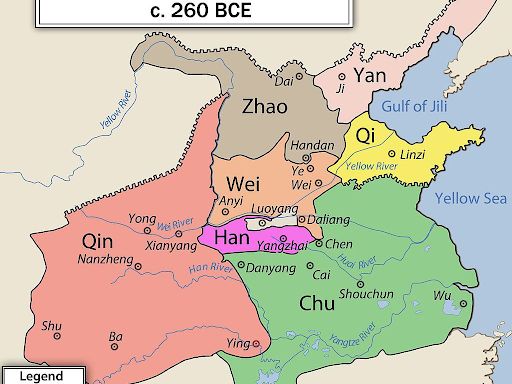Here’s an interesting fact: the most famous assassination in all of Chinese history didn’t even succeed- though it did come frighteningly close. However, had it worked out, the course of Chinese history would have been altered significantly.
Of course, I’m getting ahead of myself. Let’s back up a bit.

During the last years of the Warring States period, the state of Qin had become unstoppable in its military conquests. Slowly but surely, it was consuming its rival states; by 228 B.C, Qin had annexed the Han, Zhao, and Wei states, and showed no signs of slowing down.
As shown on the map (left), Zhao had been the only country standing between the growing Qin empire and an agitated Yan state. To the Yan government, it seemed inevitable that Qin would eventually target them as well. Without any alternatives, King Xi of Yan was forced to resort to sacrifices and negotiation. Ultimately, he arranged for his son, Prince Dan (燕太子丹), to be sent to Qin as a hostage, in return for a temporary guarantee of peace. However, Dan found a way to escape his captors, fleeing back to Yan. It seemed apparent to him that no amount of sacrifice would be enough to convince Qin not to take over. Frustrated with his father and native administration, he made it back to Yan bitter and vengeful. Upon his return, Prince Dan began plotting his revenge – the assassination of Qin Shi Huang, the emperor of Qin.
After years of preparation, Dan’s scheme was ready to be put into action. Here’s a general breakdown:
- The chosen assassin was a scholar/warrior by the name of Jing Ke (荆轲). Jing Ke originally came from the state of Wei, but had been forced to flee his home when it was conquered by Qin
- Accompanying Jing Ke would be Qin Wuyang (秦舞阳), a Yan criminal
- As an excuse to meet the emperor, the two would present two items: the (decapitated) head of Huan Yi and a map of the Yan city of Dukang
- Huan Yi (also believed to be Fan Wuji) was a Qin traitor who had fled to Yan after betraying his country. After being briefed by Jing Ke, Huan Yi willingly committed suicide and gave Jing Ke his head so that the assassination would have a better chance of succeeding.
- The map would be wrapped up around a (poisoned) dagger. That way, when Jing Ke unrolled the map, he would easily be able to access the weapon and attack.
The pair of assassins set off during the winter of 227 B.C. As Jing Ke stood by the tranquil Yi river, the frigid wind biting into his clothing, he famously sang: “风萧萧兮易水寒,壮士一去兮不复还。” or (crudely translated): “The wind gusts, the river is frigid, the hero departs, never to return.”
As the assassins entered the Qin state, their possession of both Fan Wuji’s head and a map of Dukang immediately gained them an audience with Qin Shi Huang. However, as they entered the royal palace, Qin Wuyang reportedly became so anxious that he actually began to shudder. Naturally, this roused the suspicion of many Qin officials, and Wuyang was not allowed to enter. However, Jing Ke, never one to submit to a challenge, chose to proceed alone.
Soon, he was summoned to present the map. Jing Ke approached Qin Shi Huang, and carefully began to unroll the map. As the dagger was revealed, Jing Ke seized and grabbed the emperor’s robe. However, before he was able complete the assassination, the Qin emperor tore loose from Jing Ke’s grasp and dashed behind a column. Frustrated, Jing Ke pursued him, and the two men began prancing around the column in a deadly dance.
Seeing his ruler in danger, a royal physician named Xia Wuju snatched up his medicine bag and hurled it at the assassin. It slowed Jing Ke down, allowing the emperor to recover some distance. As a matter of fact, Qin Shi Huang had been armed (with a ceremonial sword) throughout the entire ordeal- however, the long, bulky nature of his longsword, combined with the emperor’s panicked state, had made it impossible to draw and wield. Only when Qin Shi Huang was reminded by his officials did he manage to shift the scabbard behind his back, unsheathing his sword over his shoulder. Finally armed, the emperor turned back to Jing Ke, striking the assassin across his thigh. Knowing that he was close to failure, Jing Ke made one last ditch attempt to throw the dagger at Qin Shi Huang. He narrowly missed, and was quickly cut down by the imperial guard.


发表回复
要发表评论,您必须先登录。